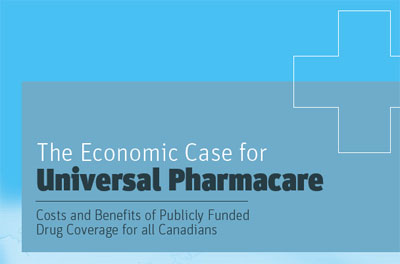This is an archive of news stories and research from the National Union of Public and General Employees. Please see our new site - https://nupge.ca - for the most current information.
Canadian Health Coalition says ‘affordability’ no longer an excuse for inaction.
Ottawa (13 Sept. 2010) - The Canadian Health Coalition (CHC) is urging the Harper government to stop stalling and start working with provincial and territorial governments to bring in a universal public Pharmacare program.
 |
The coalition has sent a letter to Prime Minister Stephen Harper appealing for action following the release of a report laying out a formula for Pharmacare that would not only offer coverage to all Canadians but could save up to $10.7 billion annually in the process.
The report, entitled The Economic Case for Universal Pharmacare, has been authored by Professor Marc-Andre Gagnon and commissioned by the Canadian Centre for Policy Alternatives (CCPA) and the Institut de recherche et d’informations socio-économiques (IRIS).
The National Union of Public and General Employees (NUPGE) is a member of the CHC and assisted in funding this new and important study.
A letter has also been sent by the CHC to Canada’s provincial health ministers, currently attending a meeting on health care, urging them to study the report and work to bring the federal government back to the table to implement a national plan.
The CHC is calling on the prime minister to direct his minister of health to return to the table with provincial and territorial counterparts and fulfill the written commitment of Canada’s first ministers to secure fair and reasonable access to safe and affordable prescription drugs for all Canadians.
In the past, the federal health minister has refused to acknowledge the existence of the National Pharmaceutical Strategy agreed to in a 2004 First Ministers Accord.
The CHC says the prime minister should go back and "read this important report" and show real leadership by acknowledging the essential role of the federal government in establishing "a fair and effective drug insurance plan for all Canadians.”
The new CCPA-IRIS report has been endorsed by a number of doctors, economists and researchers.
“The way we pay for prescription drugs is broken,” says Dr. Joel Lexchin, a professor at the school of health policy and management at York University. “Politicians hide behind the excuse that universal public coverage is too expensive. This study exposes that excuse as a fallacy. We can save money and cover everyone in the country. Medicare works and Pharmacare is no different.”
Dr. Robert Evans, a Harvard economist whose work includes comparative studies of various health care systems and funding strategies, says Canada has an American-style system of paying for drugs. "It yields American results – inequity, waste and high costs," he says.
The report says a national Pharmacare plan would enable all Canadians to enjoy equitable access to medicine while controlling the growth of drug costs.
CMC chairperson Kathleen Connors argues that Canadians have waited too long for action by government leaders at all levels.
“It is no longer credible for politicians to say we cannot afford universal public Pharmacare," she says. "The reality is Canadians cannot afford not to have Pharmacare.”
Savings projected up to $10.7 billion a year
The CHC sets out two scenarios for reaching the goal of sustainable drug prices with universal public Pharmacare. These calculations already take into account an increased cost of 10% for universal Pharmacare, covering all Canadians. The coalition's report also proposes additional policy measures to offset the additional cost.
Many countries, including France, the U.K., Sweden, Australia and New Zealand, have universal drug plans and pay far less than Canada.
Scenario 1
Current expenditure on prescription drugs - $25.1 billion
Cost savings with a universal Pharmacare plan:
- Administrative and federal tax subsidy savings by eliminating multiple private plans - $1.5 billion.
- Bring brand name drug prices down to the Organization for Economic Cooperation and Development (OECD) average - $1.4 billion.
- Eliminate the costly rebate system for generic drugs - $1.3 billion.
- Eliminate the monthly deductible and the 15-year patent protection for drugs in Quebec - $246 million.
Total savings with Pharmacare - $4.5 billion
Scenario 2:
Current expenditure on prescription drugs - $25.1 billion
Cost savings with a universal Pharmacare plan:
- Cost savings with Pharmacare and rigorous drug review and price negotiations (as in New Zealand) - $9.3 billion.
- Administrative and federal tax subsidy savings by eliminating multiple private plans - $1.5 billion.
Total savings with Pharmacare - $10.7 billion
NUPGE
The National Union of Public and General Employees (NUPGE) is one of Canada's largest labour organizations with over 340,000 members. Our mission is to improve the lives of working families and to build a stronger Canada by ensuring our common wealth is used for the common good. NUPGE
More information:
• Download Report: The Economic Case for Universal Pharmacare - pdf
• National Union publication - Create a National Pharmacare Program
